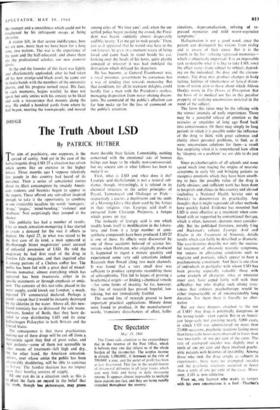AMERICA
LBJ's Silent Spring
T, •
From MURRAY KEMPTON
PRINCETON, NJ
WE suffei with the Vietnam trouble as from- a low-grade fever, having become as a people ambulatory but never quite sure of our balance. Mr Johnson has the case with fewer moments of relief than most of us; and he seems prone more than usual to be disturbed by little things and to make impulsive gestures to balance them.
The President decided quite suddenly to accept an invitation to speak at the convocation last week of Princeton University, one of those centres of learning where he has lately had the sense of authority diminished by the disaffection of Senator Fulbright. But he cannot, it seems, hope any longer for confrontations; his appear- ance produced very little passion, whether at the centre where it was lazily respectful or at the far fringes where the student peace pickets did their decorous best to be disrespectful.
Even so the President seems to have begun the affair somewhat fretful, a suspicion peevish and possibly suspicious. The Eastern academies are an occasional source of discontent to him, and his address came down hard on the duty of the intellectual to stand and conquer in his sign. Yet he had minimal reason for mistrust; he was here to help dedicate the new centre of the Wood- row Wilson School of Public and International Affairs, most of whose students are in training to serve the state; and he had no more reason to fear alienation here than would the president of General Motors confronting an audience of auto- motive engineers.
The Governor of New Jersey's state police had herded the peace pickets to a place as far as they could get them towards the outermost limits of the President's vision and still respect the right of free assembly. They were otherwise anything but a cause for alarm; even those not native to this campus seemed infected by the Princeton spring and said 'sir' to anyone to the smallest degree their senior. Afterwards one picket spread a Vietnam atrocity photograph upon the grass and sat down upon it to eat his lunch.
Still, the President's unease lasted longer that it realistically should have; at one moment, the Princeton student chorus was mustering its forces to give voice to the Festival Song of Men- delssohn, and a member of the brass section tuned his horn, and the President .turned almost with indignation to look at them through the alarming silence. His face then took on the habit of pain and burden which marked it as different from any other on the platform; he alone in the official party seemed to take it automatically for granted that something had gone wrong and that there was no one around except himself to go and straighten the boys out.
But nothing did go.wrong; matters moved IN ith charming laziness to a moment oddly touching : Robert Goheen, the university's president, sat in a high-backed chair while the President of the United States stood before him to be judged and instantly found worthy of his honorary degree. There could hardly be another occasion, outside the Church, left in all America like the academic ceremony where the private man still sits and asserts his right to judge the public one.
And then the President spoke for half an hour uninterrupted by the smallest audible response. He reminded his audience of what he called the intellectuals' new affluence of power, and promised them more federal jobs and more federal grants-in-aid; even this appeal, in the key so long tested by the Democrats for special in- terest groups, drew no applause. There was no stir when he summoned them to their duty to rally in spirit though not in body to the Asian war. For it was spring; his auditors sat in the sun around a reflecting pool; theirs was a torpor whisela could not be roused by his efforts to blow
the trumpet and a smoothness which could not be roughened by his infrequent essays at being abrasive.
A visitor felt, in that serene indifference, how we are now, more than we have been for a long time, two nations. The war is the experience of the poor and the half-educated; and above them sits the professional scholar, our new jeunexse doree.
At the end the founder of this feast was lightly and affectionately applauded; after he had taken off his new orange-and-black cowl, he came out to shake hands with the members of the university chorus, and his progress turned royal. His face, in such moments, begins wistful; he does not speak but only smiles with his anxiety to be liked and with a reassurance that mounts along the way. He ended a hundred yards from where he had begun, meeting the townspeople. and moved
among cries of 'We love you'; and, when the un- settled police began pushing the crowd, the Presi- dent was heard, suddenly almost desperately audible, to cry, 'Let me get to muh people.' Then, just as it appeared that he would stay here in the sun forever, he grew in a moment weary of being loved and came back to stand beside his car, looking over the heads of his hosts, quite plainly annoyed at whoever it was had indulged the distraction which delayed his departure.
He has become, as General Eisenhower was, a royal presence: government by consensus has a way of tending thus towards monarchy. But that condition, for all its transient delights, could hardly free a man with the President's restless, managing disposition from never-abating discon- tents. No command of the public's affection can for him make up for the loss of command on the public's attention.



































 Previous page
Previous page